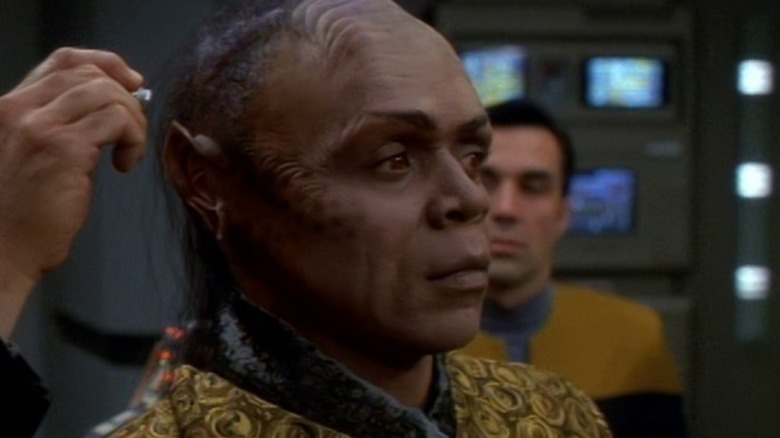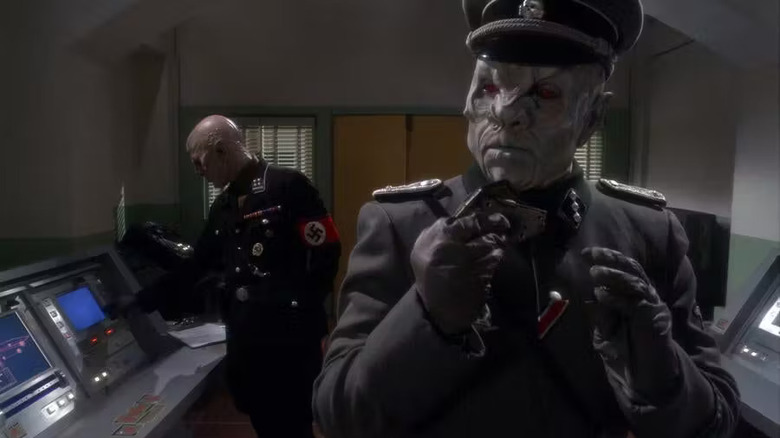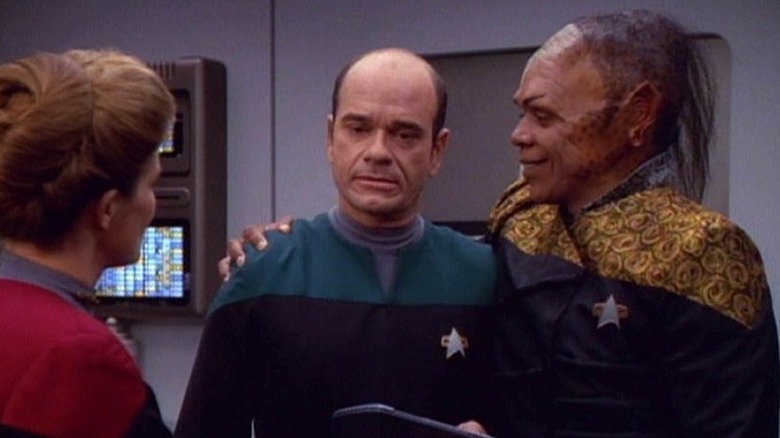Star Trek: Voyager Followed A Gene Roddenberry Rule That Left Little Room For Error
In the "Star Trek: Voyager" episode "Tuvix" (May 6, 1996), a transporter accident fused the stern, logical Vulcan Tuvok (Tim Russ) with the jolly hobbit-like chef Neelix (Ethan Phillips) into a single being. This new being, who says he's named Tuvix (Tom Wright) possesses memories and personality traits from both Tuvok and Neelix, which is a matter of great consternation from Captain Janeway (Kate Mulgrew) and the crew of the Voyager. Tuvix soon finds that he likes his new amalgam personality, finding happiness and agency as an individual.
Soon, however, the Voyager engineers find a way to reverse the effects of the transporter accident and separate Tuvix back into his two constituent beings. Tuvix objects, of course. To do so would mean to murder him. Surely a newly created person has rights just as much as any other member of the crew, and Tuvix would like them to be protected. Notoriously among Trekkies, however, Janeway ordered Tuvix to the transporter room for execution, with Tuvix protesting all the way. Janeway figures that restoring two dead crewmates outweighs the pleas of a living one. Tuvix never returned.
In addition to playing Tuvix, actor Tom Wright also played an alien named Ghrath who disguised himself as a Nazi in the "Star Trek: Enterprise" episode "Storm Front" (October 8, 2004). He also auditioned for the role of Commander Sisko on "Star Trek: Deep Space Nine." Back in 2014, Wright took to Reddit to answer questions from Trekkies. He revealed that "Voyager" had a stringent and difficult-to-follow rule on set that lingered from the days of "Star Trek" creator Gene Roddenberry (who passed in 1991). It seems that, on "Star Trek," actors are not allowed to forget lines or make flubs. Every scene must play all the way through.
The Roddenberry rule
Wright began acting professionally in the late 1970s, first appearing in the film "Deadbeat." He appeared in supporting roles in films like "Underground U.S.A." and "The Brother from Another Planet," as well as in notable genre movies like "Exterminator 2" and "Creepshow 2," in which he played the increasingly mutilated hitchhiker. He had roles in "Matewan," "Reversal of Fortune," and "Marked for Death." He turned up in a 1991 episode of "Tales from the Crypt" and played the role of Mr. Morgan in four episodes of "Seinfeld." For many years, audiences of the '80s and '90s could count Wright as one of the more ubiquitous "hey, it's that guy" supporting actors; that is: an actor you love and instantly recognize, but who never gets top billing.
Despite a thriving career, Wright saw his appearance on "Star Trek: Voyager" as a step up. He was grateful for his involvement in such a widespread phenomenon as "Star Trek," and was willing to play Tuvix to the best of his abilities. As he revealed, though, it also came with an additional Roddenberrian acting challenge. There was to be no "shooting around" any misreadings or forgotten lines. Wright wrote:
"It was my welcome to the BIG LEAGUES moment. I don't know about the other shows but Voyager was shot alongside the dictates of The Roddenberry Bible. You probably know all about it but for the sake of clarity, Gene Roddenberry compiled a set of 'Star Trek' guidelines and principles that governed the 'Star Trek' universe. One of the major tenets was that not only should actors KNOW their lines but if they were to make a mistake, there would be no continuing the scene."
Perhaps Roddenberry wanted "Star Trek" actors to feel like they were involved in live theater.
The live theater approach to shooting 'Star Trek'
Wright didn't mind the live theater atmosphere on the set, as he had already appeared on stage many times before. He continued:
"Normally if you flub a line you can stop, take a breath, and then restart from where you made a mistake. But Gene was old school and held his actors to a higher standard. We were not allowed to simply stop and pick up, We had to go back to the beginning of the scene and do it properly. Me, having been trained in the theater, LOVED THAT. He made us more responsible to the writing."
Anyone who has worked on a TV set can tell you that the script is not to be deviated from. "Star Trek" famously filmed on a fast schedule, churning out an episode every week. Scripts had to be polished to a shine, and actors had to have their lines 100% memorized. This included the strange pseudo-science and multisyllabic technobabble that the franchise was famous for. Wright knew from working in film that an actor can mess up a line, but then merely re-read it on the spot, and not cause any interruptions. An editor could conceivably cut the flub out, and leave the re-read in. Perhaps the "once through" approach to "Star Trek" was merely to keep the editing process clean; it would be easier to assemble a scene in post-production if there was no worry about editing out flubs.
Wright, ever a professional, seems to have rolled with the Roddenberry rule with aplomb.
Wright continues to work to this day, having most recently appeared in "Daisy Jones & the Six" and the 2022 film "That's Amor."


